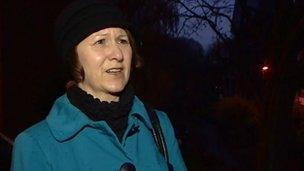Stafford Hospital inquiry was 'a harrowing time'
- Published

Julie Bailey founded the Cure The NHS group after the death of her mother at Stafford Hospital
I first met Julie Bailey when she came into the studios at BBC Radio Stoke for an interview.
It was January 2008 and I had given her a call after spotting a letter she had written to the local newspaper.
In it she described the terrible way in which her mother had been treated at Stafford Hospital, and called for anyone who had had a similar experience to contact her.
That call led to the formation of a group we now call Cure the NHS, which led the campaign for the public inquiry, and gave us the first hint as to what has become one of the biggest scandals in the history of the NHS.
Three years later, I found myself sitting in a room with very little natural light, on an uncomfortable chair, surrounded by lawyers, staring at TV screens for the day.
It is perhaps not every reporter's idea of a good time, but I can honestly say that covering the Stafford Hospital public inquiry was one of the most fascinating and memorable years of my life.
Julie and the rest of Cure the NHS had spent the past few years campaigning for this inquiry.
They felt that it wasn't enough to know what happened, but also why it was allowed to happen. Like me she was in the public gallery almost every day.
'Harrowing' evidence
Relatives, patients, local health bosses, along with politicians and some of the most influential people in the NHS were all called to the Civic Centre in Stafford to give evidence.
At times it was harrowing as witnesses described the last time they saw their loved ones alive.
There was surprise as people sitting in the public gallery realised that signs had been missed, and anger when relatives felt that witnesses were not taking responsibility for their actions.
But it was not all doom and gloom. There was a constant battle with squealing microphones, and witnesses who were told off for speaking so fast the person typing up the transcript could not keep up.
There was also the time I made an appearance after somebody's alarm went off on their phone. It started to play out BBC Radio Stoke as apparently one of the core participants liked to tune in so he could hear what I was saying about the inquiry.
On the day the inquiry chairman made his closing statement I had mixed emotions.
There was almost disbelief it was finally over, but I was relieved I could finally take a holiday without worrying I was going to miss an important witness.
It also puts me in an exclusive club. I was one of only two reporters to cover almost every day of the inquiry, and one of just a dozen people who regularly sat in the public gallery.
What we witnessed over those 12 months was an incredible insight into the workings of the National Health Service - the good, the bad, and the ugly.
The sad truth is this is not the first inquiry into failings of the NHS and it is not the first inquiry to recommend changes to stop it happening again.
The challenge for chairman Robert Francis is to try to ensure it is the last inquiry we ever need.
- Published3 February 2013
- Published23 January 2013
- Published17 January 2013
- Published8 January 2013
- Published21 November 2011